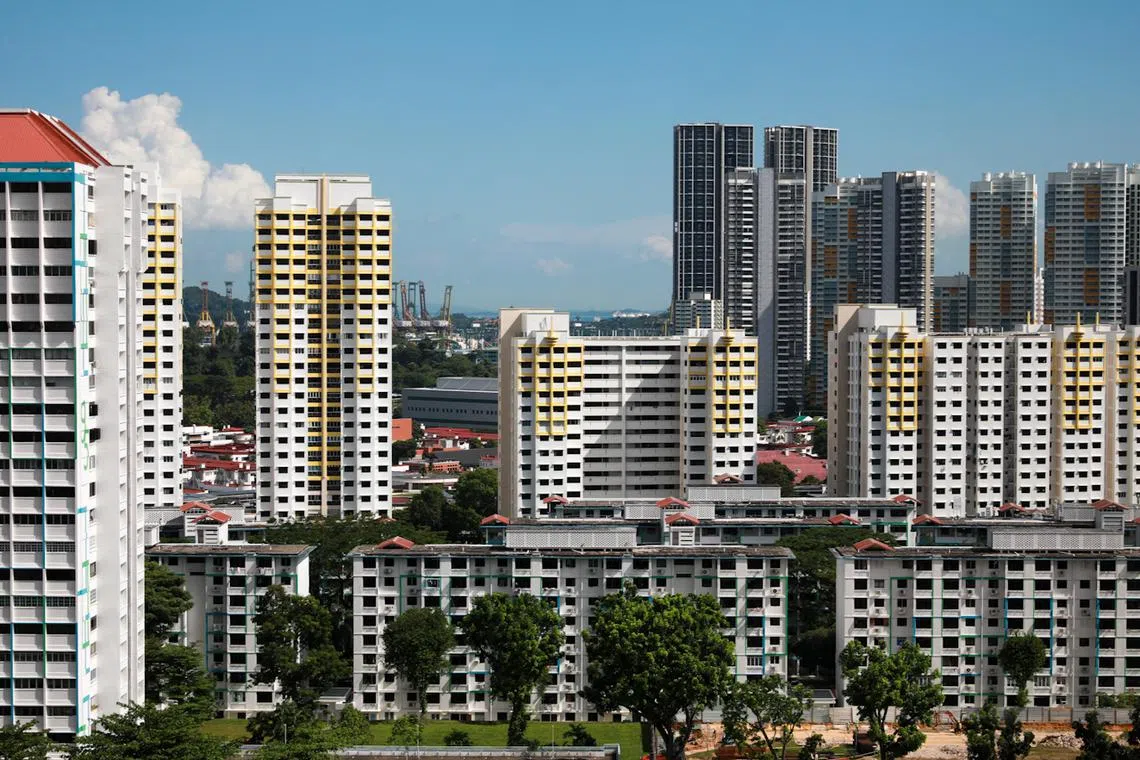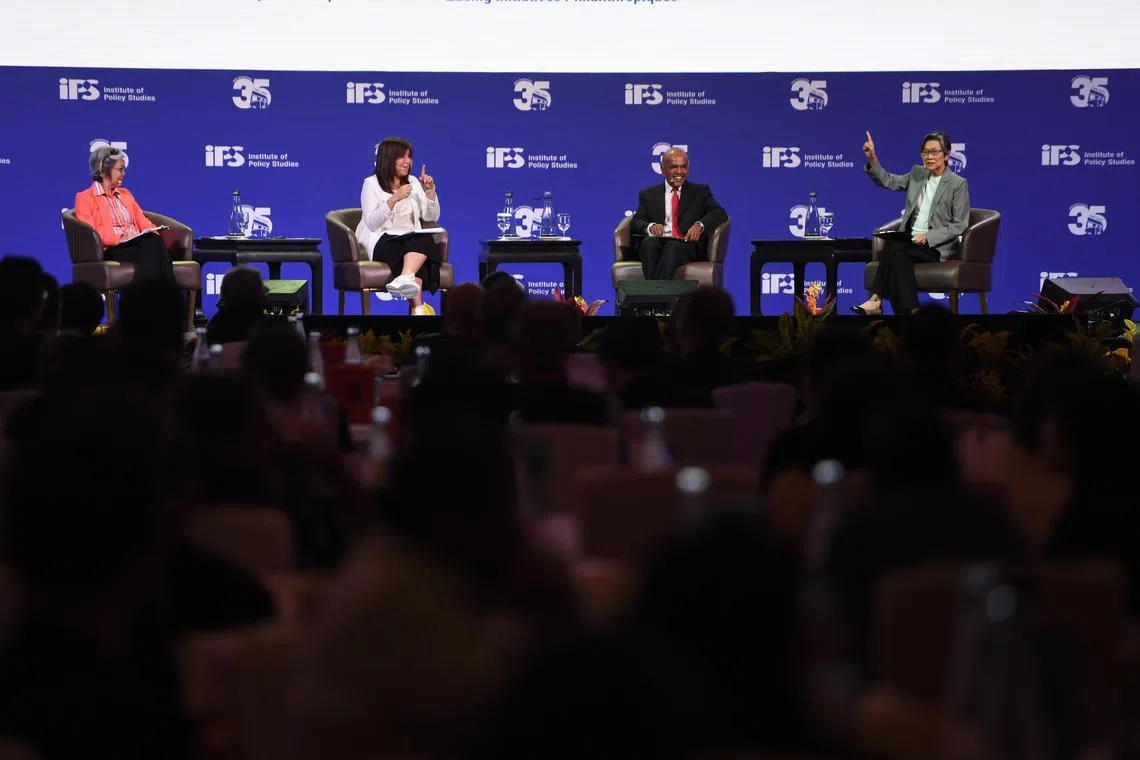Nearly a third of ethnic quota appeals for HDB flats successful in 2022: Shanmugam
Sign up now: Get ST's newsletters delivered to your inbox

Households which appealed for help with a ethnic quota policy on selling their HDB flats made up 1.5 per cent of all resale flats last year.
PHOTO: ST FILE
SINGAPORE – Almost a third of households that appealed for help with an ethnic quota policy on selling their HDB flats in 2022 were successful.
These sellers could have asked for a waiver or for more time to sell their flats, for instance.
The sales made up a small minority, or 1.5 per cent, of all resale flats last year, said Minister for Law and Home Affairs K. Shanmugam on Monday.
In 2020, about 21 per cent of households successfully appealed for a waiver of the Ethnic Integration Policy (EIP) quota on their Housing Board flats, compared with 14 per cent in 2018.
Speaking at the Institute of Policy Studies’ 35th Anniversary Conference held at the Sands Expo and Convention Centre, Mr Shanmugam said: “Our approach – rather than do away with the entire policy, which keeps Singapore cohesive, we exercise flexibility in a targeted way, to deal with the effects directly, for the small number who are affected.”
Introduced in 1989, the EIP sets ethnic quotas on flat ownership within each HDB block and neighbourhood to prevent ethnic enclaves from forming.
Mr Shanmugam noted that in 2022, nearly a third of all HDB blocks and one in 10 HDB neighbourhoods reached their EIP limits.
He said: “That is with the EIP already in place. If we didn’t have the EIP, the enclaves would have become more pronounced.”
The EIP is one of the policies the Government uses to promote racial harmony even as it acknowledges racism exists in Singapore, Mr Shanmugam told the audience of 950 at a panel, Revisiting Pluralism.
“Our starting point has to be to accept that racism is innate in human beings, and racism, therefore, is present in Singapore – like in any society. But we need to work hard, to make sure that it is not institutionalised,” he said.
Mr Shanmugam added that the advantages to being the majority in Singapore were “obvious and undeniable”, he said: “Anyone who denies that is not being objective.”
The panel was moderated by Professor Chan Heng Chee from the Lee Kuan Yew Centre for Innovative Cities at the Singapore University of Technology and Design.
The panellists were media outlet South China Morning Post executive managing editor Zuraidah Ibrahim, and Association of Women for Action and Research (Aware) executive director Corinna Lim, who each spoke on political and social pluralism.
Asked whether Singapore will ever be able to move away from the CMIO (Chinese, Malay, Indian and Others) classification,
Ms Lim questioned if more could be done to make Singapore more racially diverse, but Mr Shanmugam said the Government is committed to keeping the racial percentages constant, noting that senior Malay community leaders have sought assurance from him at dialogues that their community will not fall below 14 or 15 per cent of the population.
“The Malays are very mindful that they want to be the second-largest community in Singapore. Now if you mess with that, you undermine Malay confidence,” he said.
Mr Shanmugam also noted that the Immigration and Checkpoints Authority (ICA) has 200 races listed for families to choose from when recording a Singaporean’s race.
On political plurality, Ms Zuraidah argued that Singaporeans’ desire for political pluralism was apparent at the 2011 Presidential Election, when the government-endorsed candidate and eventual president, Dr Tony Tan Keng Yam, did not secure a majority, but about 35 per cent of the vote in the four-way election.
Ms Zuraidah said political watchers had wondered whether this year’s presidential election would again reflect Singaporeans’ appetite for a plural system.
“But then Typhoon Tharman struck,” she said, referring to Senior Minister Tharman Shanmugaratnam’s announcement on June 8 that he would run for president.
She agreed with the observers who said that his entry in the field as the “putative government-backed” candidate shows how badly the Cabinet wants to avoid the awkwardness of another closely fought contest.
“Since independence, the PAP (People’s Action Party) has had no experience in governing with anything other than a supermajority as well as near total domination of all social and political institutions, so it’s not surprising that the prospect of greater political pluralism is not attractive,” she added.

(From left) Aware executive director Corinna Lim, South China Morning Post executive managing editor Zuraidah Ibrahim and Minister for Law and Home Affairs K. Shanmugam on the panel titled Revisiting Pluralism, moderated by Professor Chan Heng Chee.
ST PHOTO: SHINTARO TAY
On Mr Tharman running for president, Mr Shanmugam said: “He’s a grown man. He (made) up his own mind.”
Responding to the sentiment that the PAP cannot accept diverse views, Mr Shanmugam said it is not the PAP that chooses the current Parliament, but the people.
“To say that we don’t welcome diversity, I think it’s not accurate. I think what you really mean is, we don’t want to lose power to somebody else. I’m not sure you’ll find any party in the world that wants to lose at elections,” he added.
Mr Shanmugam also said that among Western systems, he has yet to come across any country, outside of Scandinavian countries, that has successfully made political pluralism, the sharing of power among multiple political parties, work for its citizens.
On the other hand, one-party dictatorships have not succeeded either, he said.
He added: “Ultimately, it is our society’s ability to choose good leaders in whichever system that they want. And it’s not the PAP that decides whether there is greater or less pluralism. It’s the people of Singapore who decide.”


